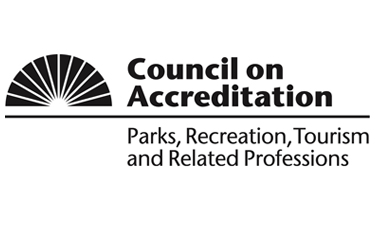 The Council on Accreditation for Parks, Recreation, Tourism, and Related Professions (COAPRT) held its fall meeting and hearings at the 2011 NRPA Congress in Atlanta, Georgia. Information on the status of the council, accredited programs, and the new learning outcomes-based standards to be adopted in 2013 were provided in the Winter 2012 Memo distributed to programs and visitors and posted on the COAPRT website. A brief overview of this information is below.
The Council on Accreditation for Parks, Recreation, Tourism, and Related Professions (COAPRT) held its fall meeting and hearings at the 2011 NRPA Congress in Atlanta, Georgia. Information on the status of the council, accredited programs, and the new learning outcomes-based standards to be adopted in 2013 were provided in the Winter 2012 Memo distributed to programs and visitors and posted on the COAPRT website. A brief overview of this information is below.
Currently, there are 82 accredited programs and one preliminary applicant. The council remains viable and committed to the academic integrity of member programs.
The 2013 standards have been or will be pilot tested by five programs, following the beta test conducted with Texas A&M University. The five schools with their hearing dates are: SUNY – Cortland (2010), Ithaca College (2011), University of Illinois (2012), Arkansas Tech (2012), and CSU Chico (2012).
The council implemented significant changes to the hearing procedures during the fall 2011 hearings. The council convened two sub-councils of five members each for the purpose of conducting concurrent hearings. Following deliberations, the full council rendered decisions, with programs learning the status of their accreditation at the conclusion of the deliberations.
Additional significant changes also were adopted.
• Programs utilizing the 2004 Standards will be reviewed on the current five-year cycle. Upon successful accreditation/reaccreditation utilizing the 2013 Standards, the standard review cycle will be seven years. Although a standard, seven-year cycle will be observed, the council may shorten the cycle at its discretion if a program experiences significant disruptions in its ability to maintain accreditation.
Programs with extensions will continue as currently scheduled.
In an effort to bring greater clarity to hearing outcomes, the council approved the following hearing actions:
1. The council may approve accreditation/re-accreditation with: commendation(s), recommendation(s), and/or a requirement that additional information be provided and/or minor revisions in the self-study and/or appendices.
2. The council may extend current accreditation and defer re-accreditation with conditions and/or warnings.
3. Deny accreditation.
Programs now have the option of addressing the standards in force at the time they began their self-study or adopting the newest version. These instructions are posted on the website, along with all prior versions of the 2013 Standards.
Council has discontinued the extension policy. As a consequence of adopting a standard-review cycle of seven years, the council considers the addition of two years as adequate time to prepare a self-study and make visitation arrangements.

